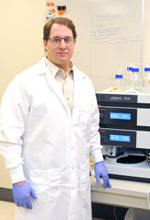 |
| Nicolas Villarino in his lab at WSU. (Photo by Henry Moore, WSU Biomedical Communications Unit) |
Research finds some gut bacteria resist malaria parasite
Microorganisms living in a person's gut play a key role in how that individual may be affected by the malaria parasite, according to studies led by a Washington State University researcher. Nicolas Villarino, assistant professor in the program in individualized medicine in the WSU College of Veterinary Medicine, led the work while he was at the University of Tennessee, Knoxville. The article can be found in the Proceedings of the National Academy of Sciences at http://www.pnas.org/content/early/2016/02/04/1504887113.abstract. The study determined the microbiological makeup of one's gut represents a significant risk factor for susceptibility to the malarial agent. Conversely, the researchers say discovering which gut bacteria convey some degree of resistance to the Plasmodium parasite that causes malaria provides an opportunity to help ward off the deadly infection. Each year, the malaria parasite spread by mosquitoes infects almost 200 million people and kills roughly a million. Approximately 3.4 billion people live in areas at risk of malaria transmission in 106 countries and territories. The disease is peculiar in that some people are infected and show no symptoms, while others have life-threatening symptoms. Until now, little was known as to why there was such an extraordinary difference in how the disease affects individuals. Dr. Villarino and colleagues studied mice that were genetically similar but obtained from different suppliers. The scientists discovered that each mouse population came with a differing set of gut microorganisms because of where they were born and raised before shipping. It turns out, those differences play a key role in the differing responses to infection by Plasmodium. The researchers also took germ-free mice and transplanted either gut bacteria known to resist the malaria parasite or gut bacteria that made the donor susceptible. The reactions to the malaria parasite were consistent with the source of the bacteria. Among differences in the gut bacteria of the resistant mice were increased numbers of the bacteria Lactobacillus and Bifidobacterium. Both are considered valuable probiotics and are used as such by the food industry.
|

